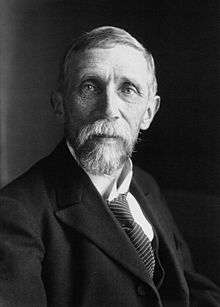Georges Goyau
Georges Goyau (31 May 1869 – 25 October 1939) was a French historian and essayist specializing in religious history.

Biography
Pierre-Louis-Théophile-Georges Goyau was born in Orléans 31 May 1869, and attended the Lycée d'Orléans before moving on to Lycée Louis-le-Grand and then École Normale Supérieure both in Paris, where he was influenced by philosopher Léon Ollé-Laprune. With his studies in Roman history he became known as a classical scholar.[1] In 1892 Goyau joined the École Français de Rome, an institute for history, archaeology, and social sciences.
In 1893 he wrote Le Pape, les catholiques et la question sociale, a democratic interpretation of Pope Leo XIII's 1891 encyclical Rerum novarum.
Goyau was a prolific writer, publishing 86 monographs. As associate editor, he penned some 110 articles for the Revue des deux mondes, a monthly literary and cultural affairs magazine, publishing a lot of articles on Catholic history, for example: L’Église libre dans l’Europe libre (The free Church in the free Europe), Les Origines religieuses du Canada (The religious origins of Canada), L’Effort catholique dans la France d’aujourd’hui (The Catholic efforts in today's France), and Le Catholicisme, doctrine d’action (Catholicism, doctrine of action). Bernard Reardon calls his five volume L'Allemagne religieuse, a detailed study of religion in German-speaking lands, Goyau's "literary achievement".[1] Goyau also composed a number of entries for the Catholic Encyclopedia.[2]
In 1922, he was elected a member of the Académie française, where he became secretary in 1938.[3] Apart from his writing he served as a director of the Hospital of the Sisters of Saint Vincent de Paul. He was also a Commander of the Legion of Honour.[4] The Académie established the Georges Goyau History and sociology Prize in his honour.
In 1903 Goyau married the writer Lucie Faure, daughter of the French president Félix Faure. His second marriage was to the Catholic writer Juliette Heuzey, who published a book called Dieu premier servi. Georges Goyau : sa vie et son œuvre in his memory in 1947
Rue Georges Goyau in Bernay is named after him.
Works
- Chronologie de l'Empire Romain. 1891[5]
- Le Pape, les catholiques et la question sociale. 1893
- Le Vatican : les papes et la civilisation. Georges Goyau. 1895
- L'Allemagne religieuse: le Protestantisme. 1898
- L'École d'aujourd'hui. 2 volumes, 1899-1906
- L'Allemagne religieuse: le Catholicisme. 4 volumes, 1905-1909
- Sainte Jeanne d'Arc. 1920
- Un grand missionnaire, le cardinal Lavigerie. 1925
- Le Cardinal Mercier. 1926
- Bismark et l'Église; le Kulturkampf
References
- Reardon, Bernard M. G., Liberalism and Tradition: Aspects of Catholic Thought in Nineteenth-century France, Cambridge University Press, 1975 ISBN 9780521207768
- "Goyau, Pierre-Louis-Théophile-Georges. The Catholic Encyclopedia and Its Makers, Encyclopedia Press, Incorporated, 1917, p. 68

- Stephen Schloesser. "Georges Goyau (1869-1939): Un intellectuel catholique sous la IIIe République (review)." The Catholic Historical Review 96.1 (2010): 156-157. Project MUSE. Web. 25 January 2013
- "Georges Goyau", Académie française
- Goyau, G., Chronologie de l'Empire Romain
- This article is based on the corresponding article in French Wikipedia.
| Wikisource has original works written by or about: Georges Goyau |
Sources
- Jérôme Grondeux, Georges Goyau (1869–1939): Un intellectuel catholique sous la IIIe République (Rome: École française de Rome. 2007) (Collection de l'École Francaise de Rome, 38).